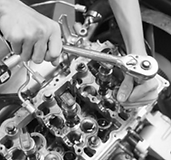Engineering and Technology Quarterly Reviews
ISSN 2622-9374




Published: 13 July 2020
One-pot Synthesis of Spirooxindole Derivatives Catalyzed by Bi2Fe4O9 Nanoparticles
Abdul Rauof Rashid, Azizullah Yosufi, Mohammad Ali Khlili
University of Bamyan, Afghanistan

Download Full-Text Pdf
10.5281/zenodo.3940869
Pages: 46-51
Keywords: Nanoparticles, Sol-gel, Bismuth Ferrite, Spirooxindole Derivatives, Malononitrile, Green Solvent
Abstract
In this study regarding the catalytic application of Bismuth Ferrite nanoparticles in the synthesis of heterocyclic compounds, we synthesized Bi2Fe4O9 nanoparticles by sol-gel combustion method from bismuth nitrate pentahydrate [Bi(NO3)3.5H2O] and iron nitrate nonahydrate [Fe(NO3)3.9H2O] as starting materials. Structural and microstructural were characterized using X-ray diffraction (XRD), Field Emission Scanning Electron Microscopy(FESM), Vibrating-Visible Spectroscopy(VSM) and infrared spectroscopy (IR). The average size of nanoparticles was determined 36, 3 nm, by XRD and Scherer’s equation. The results show that the pure phase of Bi2Fe4O9 can be formed by this method. Then it is used in the one- pot synthesis of spirooxindole derivatives via three-component reaction of isatins, malononitrile and 1,3- dicarbonyl compounds in water as a green solvent in the temperature of 80℃. The reaction yields 88-98 percentages of the products. The catalyst was reused several times in the same reaction yielding unchanged products.
References
Ugi, I., 2001. Recent progress in the chemistry of multicomponent reactions. Pure and Applied Chemistry, 73(1), pp.187-191.
Climent, M.J., Corma, A. and Iborra, S., 2012. Homogeneous and heterogeneous catalysts for multicomponent reactions. RSC advances, 2(1), pp.16-58.
Stercker, A.Libeigs Ann. Chem. 1882,215,1.
Bhaskar, G., Arun, Y., Balachandran, C., Saikumar, C. and Perumal, P.T., 2012. Synthesis of novel spirooxindole derivatives by one pot multicomponent reaction and their antimicrobial activity. European journal of medicinal chemistry, 51, pp.79-91.
Dömling, A. and Ugi, I., 2000. Multicomponent reactions with isocyanides. Angewandte Chemie International Edition, 39(18), pp.3168-3210.
Allahresani, A., Taheri, B. and Nasseri, M.A., 2018. Synthesis of spirooxindole derivatives catalyzed by GN/SO 3 H nanocomposite as a heterogeneous solid acid. Research on Chemical Intermediates, 44(11), pp.6979-6993.
Bhaskar, G., Arun, Y., Balachandran, C., Saikumar, C. and Perumal, P.T., 2012. Synthesis of novel spirooxindole derivatives by one pot multicomponent reaction and their antimicrobial activity. European journal of medicinal chemistry, 51, pp.79-91.
Shanthi, G., Subbulakshmi, G. and Perumal, P.T., 2007. A new InCl3-catalyzed, facile and efficient method for the synthesis of spirooxindoles under conventional and solvent-free microwave conditions. Tetrahedron, 63(9), pp.2057-2063.
Hassani, H., Zakerinasab, B. and Nozarie, A., 2018. Sulfonic acid supported on Fe2O3/VO2 nanocatalyst: a highly efficient and reusable nanocatalyst for synthesis of spirooxindole derivatives. Asian Journal of Green Chemistry, 2(1), pp.59-69.
Hemmat, K., Nasseri, M.A. and Allahresani, A., 2019. CoFe2O4@ SiO2@ Co (III) Salen Complex: A Magnetically Recyclable Heterogeneous Catalyst for the Synthesis of Quinoline Derivatives in Water. ChemistrySelect, 4(14), pp.4339-4346.
Allahresani, A., Taheri, B. and Nasseri, M.A., 2018. A green synthesis of spirooxindole derivatives catalyzed by SiO 2@ gC 3 N 4 nanocomposite. Research on Chemical Intermediates, 44(2), pp.1173-1188.
Yu, F., Huang, R., Ni, H., Fan, J., Yan, S. and Lin, J., 2013. Three-component stereoselective synthesis of spirooxindole derivatives. Green chemistry, 15(2), pp.453-462.
Nandakumar, A., Thirumurugan, P., Perumal, P.T., Vembu, P., Ponnuswamy, M.N. and Ramesh, P., 2010. One-pot multicomponent synthesis and anti-microbial evaluation of 2′-(indol-3-yl)-2-oxospiro (indoline-3, 4′-pyran) derivatives. Bioorganic & medicinal chemistry letters, 20(14), pp.4252-4258.
Thangamani, A., 2010. Regiospecific synthesis and biological evaluation of spirooxindolopyrrolizidines via [3+ 2] cycloaddition of azomethine ylide. European journal of medicinal chemistry, 45(12), pp.6120-6126.
Yeung, B.K., Zou, B., Rottmann, M., Lakshminarayana, S.B., Ang, S.H., Leong, S.Y., Tan, J., Wong, J., Keller-Maerki, S., Fischli, C. and Goh, A., 2010. Spirotetrahydro β-carbolines (spiroindolones): a new class of potent and orally efficacious compounds for the treatment of malaria. Journal of medicinal chemistry, 53(14), pp.5155-5164.
Ghahremanzadeh, R., Rashid, Z., Zarnani, A.H. and Naeimi, H., 2013. Synthesis of novel spirooxindoles in water by using MnFe2O4 nanoparticles as an efficient magnetically recoverable and reusable catalyst. Applied Catalysis A: General, 467, pp.270-278.
KL, J.T.K., 2006. Wolff K. Yin H. Bieza K. Caldwell J. Bursulaya B. Wu TY.-H. He Y. Bioorg. Med. Chem. Lett, 16, p.2105.



